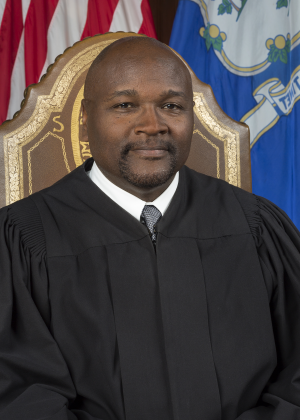
UHart will commemorate the life and legacy of civil rights leader Dr. Martin Luther King Jr. on Wednesday, January 31, at 12:45 p.m. in Lincoln Theater. The 2024 theme is “Love: Hate Is Too Great A Burden to Bear.” The observance will include the presentation of the 2024 MLK Beloved Community Awards.
The annual observance provides an opportunity for our community to pause and reflect on the work and impact of Dr. King, while recommitting to the goal of showing empathy, respect, and understanding toward one another in an effort to make the world a better place.
Featured Keynote Speaker
The Honorable Richard A. Robinson, the first African American Chief Justice of the Connecticut Supreme Court, will be the keynote speaker.

The Honorable Richard A. Robinson was born December 10, 1957, in Stamford, Connecticut. He graduated with a Bachelor of Arts degree from the University of Connecticut in 1979 and a Juris Doctor degree from West Virginia University School of Law in 1984. He was admitted to the West Virginia Bar and the Connecticut Bar, and is a member of the U.S. District Court, Northern District of West Virginia and the U.S. District Court, Connecticut.
Justice Robinson’s career is complemented by an array of public and judicial service:
- President of the Stamford Branch of the NAACP (1988–1990)
- General Counsel for the Connecticut Conference of the NAACP (1988–2000)
- President of the Assistant Corporation Counsel’s Union (AFSCME) (1989–2000)
- Commissioner of the Connecticut Commission on Human Rights and Opportunities (1997–2000)
- Chair of the Connecticut Commission on Human Rights and Opportunities (1999–2000)
- New Haven Inn of Court member (2002–present)
- Judicial Education Curriculum Committee member (2002–2014)
- Judicial Education Committee member (2003–2014)
- Faculty at several Judicial Institutes as well as spring and fall lectures (2003–present)
- Civil Commission member (2005–2014)
- Court Annexed Mediator (2005–2014)
- Lawyers Assistance Advisory Board member (2007–present)
- Bench-Bar Foreclosure Committee (2007–2014)
- Legal Internship Committee (2013–2017)
- Chairperson of the Advisory Committee on Cultural Competency (2009–2022)
- Chairperson of the Rules Committee (2017–2018)
- Connecticut Bar Association Young Lawyers Section Diversity Award (2010)
- Connecticut Bar Association's Henry J. Naruk Judiciary Award for Integrity (2017)
- NAACP 100 Most Influential Blacks in Connecticut
- Connecticut Bar Foundation James W. Cooper Fellows, Life Fellow
- Discovering Amistad National Advisory Board
- Commission on Human Rights and Opportunities’ Alvin W. Penn Award for Excellence in Leadership (2018)
- Ebony Magazine Power 100 Award (2018)
- Quinnipiac School of Law Black Student Association Thurgood Marshall Award (2019)
- ABOTA Judicial Excellence Award (2019)
- Connecticut Bar Foundation Distinguished Service Award (2020)
- National Board of Directors of the Conference of Chief Justices (2019–2022)
- Conference of Chief Justices Civil Justice Board of Directors (2020–2022)
- National Judicial Task Force to Examine State Courts’ Response to Mental Illness (2020–2022)
- Committee on Federal-State Jurisdiction of the Judicial Conference of the United States (2022– present)